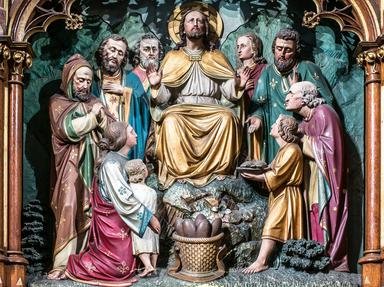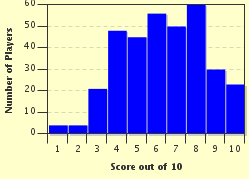Quiz Answer Key and Fun Facts
1. Two men from the Hebrew Bible, or the Old Testament of the English Bible, appeared with Jesus on Mount Transfiguration, as per Matthew 17, Mark 9 and Luke 9. Who were the two men from the Old Testament?
2. A Gentile woman from the Hebrew Bible, or the Old Testament of the English Bible, is mentioned in the genealogy of Christ, as per Matthew 1:5. She is best known for being the great-grandmother of King David. What is her name?
3. It should come as no surprise King David is mentioned dozens of times in the New Testament. After all, his name appears more than 1,000 times in the Hebrew Bible. According to many Christian theologians, why is it significant people in the New Testament often referred to Jesus as the 'Son of David'?
4. King Solomon is mentioned more than 250 times in the Hebrew Bible and more than ten times in the New Testament. In fact, Jesus, on occasion, made mention of the great Israelite king. Luke 12:27, for example, quotes Christ as saying, "Consider the lilies, how they grow: they neither toil nor spin; and yet I say to you, even Solomon in all his glory was not arrayed like one of these." The passage is part of a discourse that runs from Luke 12:22-34. What's the general theme of the discourse?
5. In Hebrews 11:17, Abraham is praised by the writer of the book for his faith. In this particular passage, what example is cited of Abraham's faith?
6. Isaac's name appears in seven different books in the NKJV of the New Testament, three of which are Gospels. What's the name of the Gospel in which Isaac's name does not appear?
7. Rachel was the wife of Jacob and the mother of Joseph and Benjamin, yet her name appears only once in the New Testament and is used in only a figurative sense.
8. In Matthew 24:15-16 Jesus quotes an old Testament prophet when talking about the end times, or the Great Tribulation. Here's the quote with the prophet's name removed: "Therefore when you see the 'abomination of desolation,' spoken of by _____ the prophet, standing in the holy place (whoever reads, let him understand), then let those who are in Judea flee to the mountains." What's the name of the prophet Jesus quoted?
9. Rahab, without question, is best known for being a prostitute in Jericho who gave safe haven to two Israelite spies. However, her name appears in three different books in the New Testament. In Matthew 1:5, the famous prostitute's name appears in the genealogy of Christ and in Hebrews 11:31 she is commended for her faith. What's the name of the third New Testament book in which she is praised for her works?
10. Melchizedek is a name from the Hebrew Bible that appears more times in the New Testament than it does in the Old Testament. His name is found twice in the Old Testament (Genesis 14:18 and Psalm 110:4) but no less than nine times in the New Testament of the KJV Bible. Who was Melchizedek?
Source: Author
Cowrofl
This quiz was reviewed by FunTrivia editor
CellarDoor before going online.
Any errors found in FunTrivia content are routinely corrected through our feedback system.

